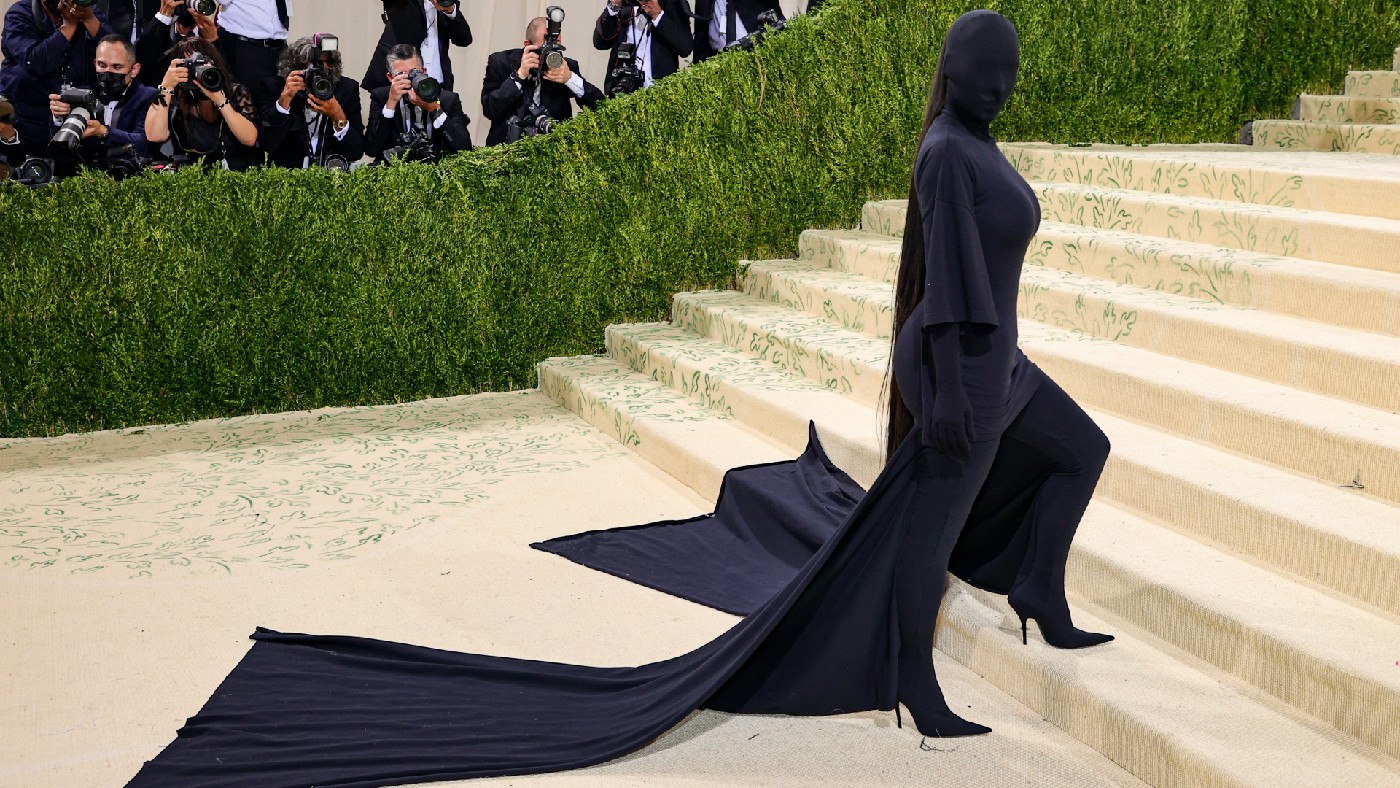Balenciaga and the long history of ‘shockvertising’
Fashion brands such as Benetton, Calvin Klein and FCUK have all created shocking ads resulting in free media coverage that benefited the brand

A free daily email with the biggest news stories of the day – and the best features from TheWeek.com
You are now subscribed
Your newsletter sign-up was successful
Carl W Jones, Course Leader and Senior Lecturer at the University of Westminster’s School of Media and Communication explains how Balenciaga’s supposed advertising faux-pas has all the hallmarks of a deliberate attempt for media coverage.
Kim Kardashian is refining her personal brand. Right-wing news outlet Fox TV is gaining viewers through attention-grabbing headlines. Photographer Gabriele Galimberti is gaining notoriety. All this is due to a recent advertising campaign from leading global fashion brand Balenciaga that has caused widespread controversy.
One photograph shows a child in a string vest holding a bondage gear-clad teddy bear. Another shows a handbag resting on paperwork about child abuse. Balenciaga responded to the backlash to its campaign by issuing an apology that blamed the set designers and photographers for the uncomfortable messages. It has also filed a US$25 million lawsuit against the campaign’s producers.
The Week
Escape your echo chamber. Get the facts behind the news, plus analysis from multiple perspectives.

Sign up for The Week's Free Newsletters
From our morning news briefing to a weekly Good News Newsletter, get the best of The Week delivered directly to your inbox.
From our morning news briefing to a weekly Good News Newsletter, get the best of The Week delivered directly to your inbox.
As an expert in branding who has worked in advertising for over 25 years, I am wary of Balenciaga’s responses. All major brands have people in place to approve these types of advertising campaigns. The approval process would be especially comprehensive for a brand like Balenciaga, which spends around US$100 million a year on publicity.
Advertising is, of course, designed to get attention. According to the University of Southern California, urban consumers see more than 5,000 advertising messages a day but remember only three or four. Brands invest a lot of money with the goal of becoming one of those memorable ads.
One technique used to achieve that goal is “shockvertising” – an advert that “deliberately, rather than inadvertently, startles and offends its audience by violating norms for social values and personal ideals”. Fashion brands such as Benetton, Calvin Klein and FCUK have all created shocking ads resulting in free media coverage that benefited the brand and those associated with it.
A history of successful fashion shockvertising
From the 1970s through to the early 2000s, Italian clothing brand Benetton created simple photographic adverts that featured controversial topics. A priest and a nun kissing. A black woman nursing a white baby. A man dying of Aids surrounded by his family.
A free daily email with the biggest news stories of the day – and the best features from TheWeek.com
These adverts, placed in popular magazines and on billboards, were designed to attract attention. The dying man imagery, for example, was published as news broke that Aids had become the leading cause of death for young men in the US. The campaign’s creator Oliviero Toscani became world famous and Benetton an even more popular global brand, although it later severed ties with the photographer.
In the early 2000s, French Connection launched a campaign around the acronym FCUK (French Connection United Kingdom). Its slogan “FCUKinkyBugger” caused Britain’s advertising watchdog, the Advertising Standards Authority (ASA), to respond to 132 complaints from the public. French Connection reacted by putting the sign “Sorry FCUK” in its store windows, attracting even more young consumers to their high street stops and increasing sales from £6.4 million to £19m.
In 1980, Calvin Klein released adverts featuring the very young supermodel Brooke Shields modelling the brand’s jeans while saying: “Do you know what comes between me and my Calvins? Nothing.”
The print and TV ads placed the 15-year-old in sexually provocative positions and caused an uproar with the public. In the US, ABC network stations banned the TV commercial. However, due to the controversy, Calvin Klein boosted sales and Brooke Shields’ career took off. She has since appeared on over 300 magazine covers internationally and starred in Hollywood films.
Who benefits from shockvertising?
As these examples demonstrate, people associated with a shockvertising campaign can take advantage of the news it generates to further their own interests.
Kardashian, who has been something of a muse for Balenciaga in recent years, published a reaction on her Instagram to the controversial campaign. This allowed her fanbase to voice their opinions on the matter, an example of Kardashian using controversy to build up her personal brand.
Galimberti, who photographed some of the most controversial images in the Balenciaga campaign, stated: “I was not entitled in whatsoever manner to … choose the products, nor the models, nor the combination of the same.” He has since given several interviews to mainstream media, bringing his name to an even bigger audience and, potentially, the opportunity to gain new clients.
Balenciaga did not respond to our request for comment on whether the campaign may have intentionally courted press coverage. The brand’s creative director Demna Gvasalia, however, issued a public statement on December 2 taking personal responsibility for the campaign.
“As much as I would sometimes like to provoke a thought through my work, I would NEVER have an intention to do that with such an awful subject as child abuse that I condemn,” he told his Instagram followers. “It was inappropriate to have kids promote objects that had nothing to do with them.”
Shockvertising strategies allow adverts to be seen by millions of potential consumers despite being aired for only a limited amount of time before being taken down. As the current Balenciaga controversy demonstrates, the way to make paid advertising work harder is to get it talked about for free.
Carl W Jones, Course Leader & Senior Lecturer, School of Media and Communication, University of Westminster
This article is republished from The Conversation under a Creative Commons license. Read the original article.
-
 6 of the world’s most accessible destinations
6 of the world’s most accessible destinationsThe Week Recommends Experience all of Berlin, Singapore and Sydney
-
 How the FCC’s ‘equal time’ rule works
How the FCC’s ‘equal time’ rule worksIn the Spotlight The law is at the heart of the Colbert-CBS conflict
-
 What is the endgame in the DHS shutdown?
What is the endgame in the DHS shutdown?Today’s Big Question Democrats want to rein in ICE’s immigration crackdown
-
 All’s Fair: Ryan Murphy’s legal drama is an ‘abomination’
All’s Fair: Ryan Murphy’s legal drama is an ‘abomination’Talking Point Kim Kardashian is at best ‘inoffensively useless’ in this glossy show about an all-female law firm in Los Angeles
-
 Do salmon sperm facials work?
Do salmon sperm facials work?In the Spotlight The peculiar-sounding beauty treatment claims to have anti-ageing benefits, and has attracted celebrity devotees including Kim Kardashian
-
 Kim Kardashian's Met Gala corset: designed for drama but a step too far?
Kim Kardashian's Met Gala corset: designed for drama but a step too far?In the Spotlight Reality TV star shocks with 'impossibly tiny waist' at this year's fashion event, echoing controversies from previous outfits
-
 How toxins, heavy metals and possibly radioactive polonium are found in vapes
How toxins, heavy metals and possibly radioactive polonium are found in vapesfeature Vapers don’t know what they’re inhaling and cannot be certain of the health impacts
-
 How to immerse yourself in the Edinburgh Fringe 2023
How to immerse yourself in the Edinburgh Fringe 2023feature Given the scale of the festival navigating the array of shows on offer can be a challenge
-
 Why schoolchildren are regularly being targeted by terrorist groups in many countries
Why schoolchildren are regularly being targeted by terrorist groups in many countriesfeature Attacks on schools seen as a good way to bring attention to a cause by armed groups
-
 Is Eurovision finally cool?
Is Eurovision finally cool?feature Many British fans of Eurovision speak enthusiastically about its tolerance and openness
-
 BMW M3 Touring review: what the car critics say
BMW M3 Touring review: what the car critics sayfeature A sensational all-rounder, the car is ‘eye-wateringly, cheek-puffingly good to drive fast’